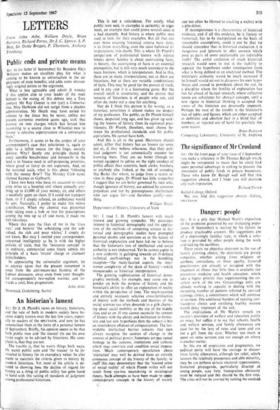An historian's lament
Sir: Dr T. H. Plumb'i views on history, historians, and the role of both in modern society have be- come widely known over the last few years, especi- ally to readers of the SPECTATOR, and now he has summarised them in the form of a personal lament (8 September). Briefly, his opinion seems to be that both public men and 'the masses' (to use his own term) ought to be advised by historians. His com- plaint is, that they are not.
The trouble is, that he wants things both ways. He wants public men and 'the masses' to be in- structed' in history for its exemplary value; he also wants to maintain the criteria given to history by modern historians. Yet most of his article is de- voted to showing how the decline of regard for history, as a thing of public utility has gone hand in hand with this raising of standards of judgment among professional historians- •
This is not a coincidence. For surely, what public men seek in examples is certainty; in argu- ment, an example that could prove several cases is a bad example. And history is where public men used to look for their examples. But all that our ever more exacting historical criteria have done, is to throw everything, even the most hallowed in- terpretations, into doubt. This is where Dr Plumb's comparison of professional history with science breaks down. Science is about ascertaining facts; in history, the ascertaining of facts is an essential prerequisite, but is still very much secondary to the main business, which is interpretation. And in this, there are as many interpretations, not as there are historians, but as there are variable combinations of facts. This may be good for the pursuit of truth, and in any case it is a fascinating game. But the overall result is uncertainty, and the picture that remains of historians is of people who can, and often do, make out a case for anything.
Nor do I think this picture is far wrong; as a historian, sometimes it almost makes me despair of my profession. The public, as Dr Plumb himself shows, despaired long ago, and has given up seek- ing the lessons of history from its equivocal prac- titioners. Dr Plumb, therefore, must choose be- tween his professional standards and his public aspirations. He cannot have both.
And this is all to the good. Historians should
admit, either that history has no lessons (as some do) or, if they believe otherwise, that their poli- tical judgment is not automatically sounder for knowing them. They are no better (though no worse) equipped to advise on the right conduct of public affairs than scientists, bank clerks, butchers, or anybody else. Indeed, at the risk of sounding like Burke (for whom, to judge from a recent re- view in these pages, Dr Plumb has little sympathy) I suggest that we are better governed by men who, though ignorant of history, are advised by common prejudices and not by presumptuous intellectuals whO- can argue for—and therefore justify—any- thing.
William Doyle Department of History, University of York






























 Previous page
Previous page